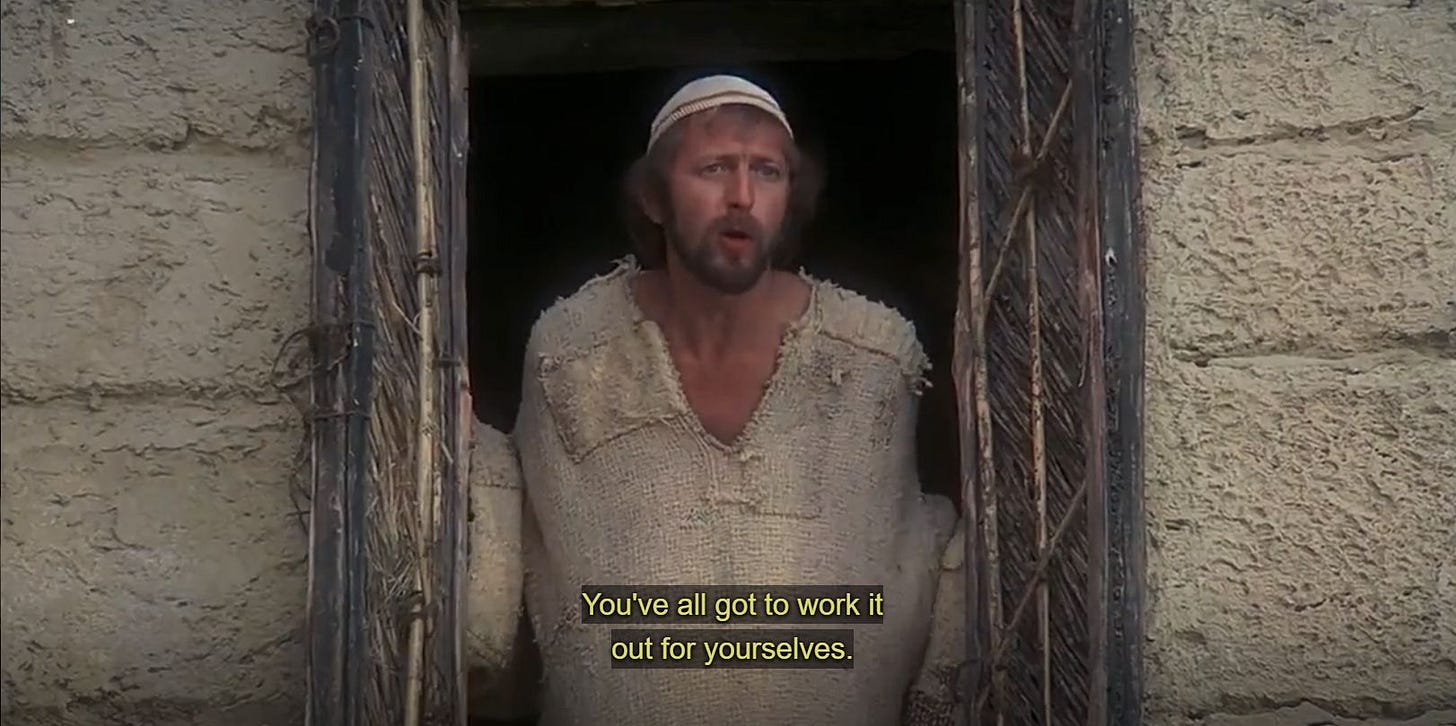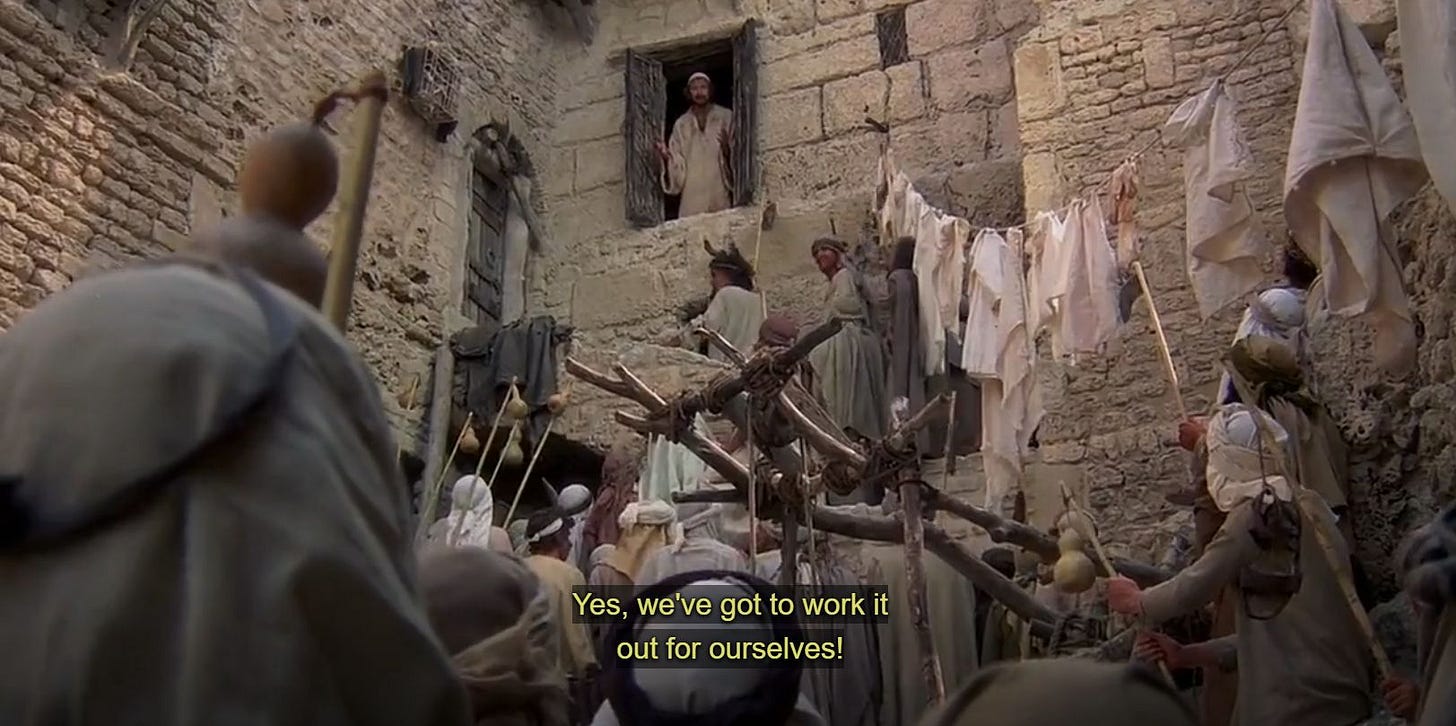When Shame = Pride
I surely would not be the first to suggest that our puzzling politics in the Anglosphere make Monty Python’s "Life of Brian" (1975) look prescient and profound.
A New Yorker cartoon published on June 4, 2001 features two fellows hanging out barefoot on their sofa. They’re reading the paper, getting their fingers black with ink, back when people did such things. (Apple had only commercialized the first tablet, the original iPad, in 2007. In 2001, people still looked forward to going out and picking up the paper.) One fellow is speaking into his cordless phone… or Motorola StarTAC flip-phone: “We’re not doing anything for Gay Pride this year. We’re here, we’re queer, we’re used to it.”
How refreshing it would be were everyone above the age of … 21 really “used to it”—used to just being themselves. I would even put in a bid for “above the age of 31.” Instead, we operate in a political environment in which the establishment encourages certain self-identified classes of people to never get used to it, but, rather, to demand that everyone else affirm and celebrate whatever “it” is. Hence the ever growing menu of Pride Parades, Pride Weeks, Pride Months. There is a lot of pride out there, but not, it seems, much self-respect. That is not a healthy state of affairs.
Meanwhile, we can at least excuse adolescent teens for not being used to just being themselves. A hundred-billion teens or so will have come before them, and all of those young people will have had the same task ahead of them: To learn to accept oneself. And they might then come to appreciate a magical thing. Having come to accept oneself, others will find it easier to accept that person. Others respect self-respect. But, even if some others still have a problem with what that person’s about, then that is just that: their problem.
One of many aphorisms attributed to Eleanor Roosevelt comes to mind. It goes something to the effect of “No one can make you feel bad about yourself without your permission.” That’s Eleanor’s invitation to do a little growing up and not to define oneself by what other people think.
What of older people? For example, what of the blue, pink, green-haired public school teachers who (we’ve been hearing) lecture to very young children about those same teachers’ sexual orientations? Do little kids need to hear about this? Are adults really looking to small kids to affirm their sexual identities for them? Can’t we allow pre-adolescent children to just be children before they hit puberty?
We know about this business in the schools, because some of these same teachers insist on telling us. Again, just observe all of the “pride” content, and, by now it may be common knowledge that some number of “preschool teachers” have posted testimonials online on sites like TikTok.com. Indeed, I just went on to TikTok to search for videos—I had to register—and upon entering the search phrase “public school teacher,” TikTok automatically suggested the deficiently punctuated search phrase “im a trans preschool teacher”. The search draws up some edgy content as well other content in which posters debate the merits or demerits of such content. I leave it to the reader to decide for him or herself what to make of it.
This morning the Studio Theatre in Washington, DC sent out this mass email:
I can’t help but cite constitutional scholar Dave Chappelle: “You’re entitled to your delusions, but am I required to go along with your delusions?”
Saying things like that has gotten Dave assaulted on stage within the last month or so. Meanwhile, let me suggest the following passage given that most of the “Pride” phenomenon actually appears to be driven by affluent white people. (Is it?) Towards the end of the novel Jazz (1992), Toni Morrison encapsulates her main point thusly:
And all the kinds of white people there are. Two kinds. The ones that feel sorry for you, and the ones that don’t. And both amount to the same thing. Nowhere in between is respect.
This passage has some of the flavor of Malcolm X’s admonition to “beware the white liberal.” It is delivered to the reader from the perspective of a character who makes a fleeting appearance late in the book somewhere in 1940’s America. It would be great if we could interview Toni and ask if the passage builds up to an even larger point about self-respect. Is not self-respect a powerful refuge within which we can comfortably ensconce ourselves no matter what other people think?
A few months ago, I posted an essay titled “The Revenge of the Nerds.” The essay amounted to an intendedly gentle expression of the idea that doing a little growing up is empowering; submitting to suggestions to make a career of feeling bad for oneself is disempowering.
I enlisted the help of people cleverer than myself to develop some points: A Taoist sage, Tolstoy, Thackeray, Jerzy Kosinski, Susan Sontag, Milan Kundera, … Walker Percy, Boethius. Even the cranky, often intolerant St. Paul had something to contribute.
If I were to do a little more research, I might now enlist the help of Russell Brand. Russell has developed quite an online following over the last year or so, and much of the content he and his people put out is targeted at people suffering with addiction issues. The most fundamental message he keeps coming back to is: There’s no helping anyone or even oneself if no one is yet equipped to help oneself.
It’s a “tough love” message delivered from a place of experience. We have to take responsibility for ourselves. That is hardly a novel bit of wisdom, but much of our politics seems to be consumed with this business of working out personal issues in the public policy sphere. A common theme seems to be, “There should be a law against that.” Hence things like laws against “hate speech.” Like, who can not be against hate, right? But, given purveyors of hate may yet define the speech of others as hateful … One can see how the laws can be strategically deployed and manipulated. But we can neutralize such hazards by not getting in to the business of trying to regulate our way to happiness. We’ve got to work out our own shit for ourselves. One should not have to say that, but our adolescent politics seem to demand it.
Let me again appeal to Susan Sontag, also from the New Yorker magazine in 2001:
Politics, the politics of a democracy—which entails disagreement, which promotes candor—has been replaced by psychotherapy. Let’s by all means grieve together. But let’s not be stupid together.
This scene, “He’s Not the Messiash,” from Life of Brian is apposite:
Feel free to read along from the script:
BRIAN: Good morning.
FOLLOWERS: A blessing! A blessing! A blessing!...
BRIAN: No. No, please! Please! Please listen. I've got one or two things to say.
FOLLOWERS: Tell us. Tell us both of them.
BRIAN: Look. You've got it all wrong. You don't need to follow me. You don't need to follow anybody! You've got to think for yourselves. You're all individuals!
FOLLOWERS: Yes, we're all individuals!
BRIAN: You're all different!
FOLLOWERS: Yes, we are all different!
DENNIS: I'm not.
BRIAN: You've all got to work it out for yourselves!
FOLLOWERS: Yes! We've got to work it out for ourselves!
BRIAN: Exactly!






Well put. It's sad that our children are involved in our toxic debates as they try to understand their socialization. There is a Trans Youth Project to examine gender identity that claims children as young a 6 understand gender. See DOI: 10.1542/peds.2021-056082 and an associated MedPage article https://www.medpagetoday.com/endocrinology/generalendocrinology/98602. I'm sure there is a lot of other science surrounding our meddling in healthy development of children. I'm dismayed that this seems to be a good thing. We are pushing hard to develop victims and further separate us. Elsewhere in the world the quite rare actual trans people evolve to exist and be accepted into society as they have forever. Few actually attempt to alter themselves surgically or medicate to achieve different secondary sex characteristics. And, yes, they often are discriminated against for being different. It's only in recent years been even possible to medically intervene and yet we have clinics rising to provide those services to some who are simply trying to understand themselves. Do we really need all the clinics?